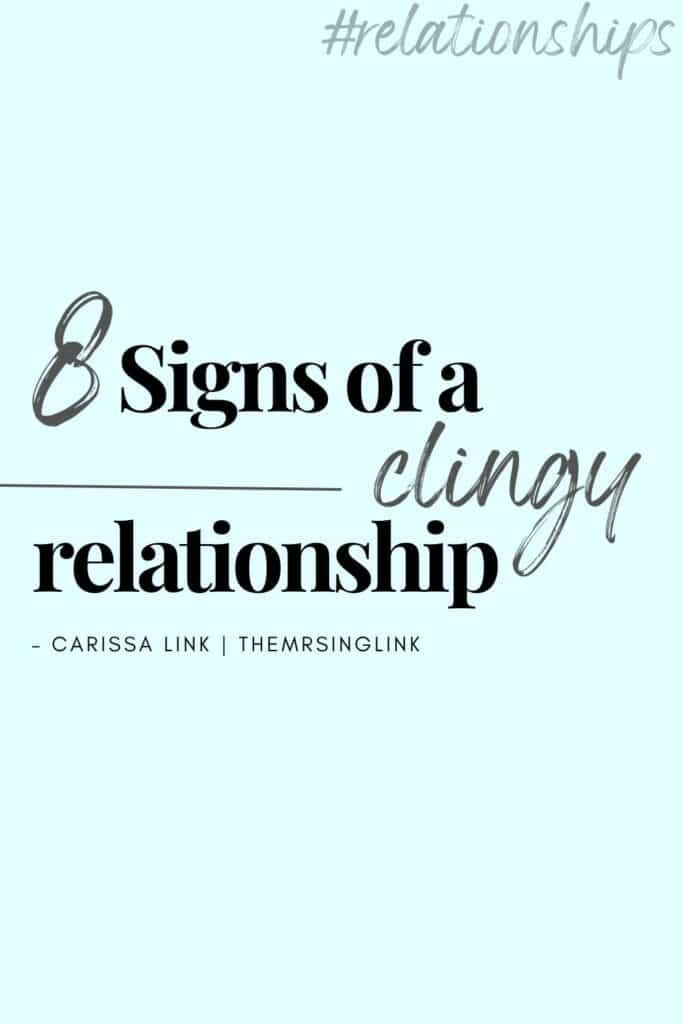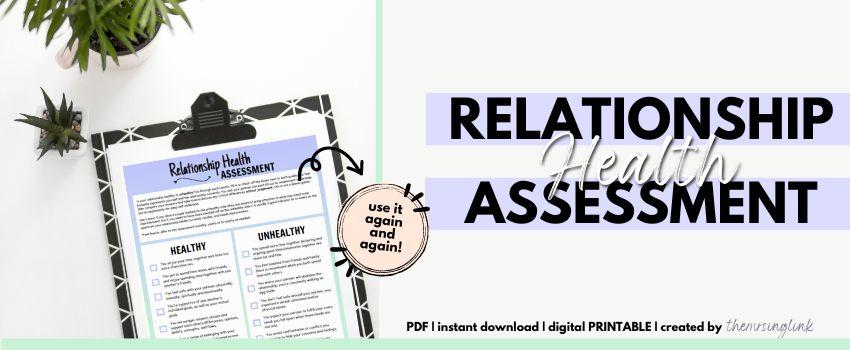It’s no surprise – we’re already quick to label clinginess by its select and stereotypical qualities. But what are some of the brushed-under-the-rug signs of a clingy relationship? You know, the soft spots we’re not really ready to touch on, or admit.
This isn’t talked about as much, but the damaging effects – IMO – can be far greater for the clingy individual. The weight they carry is much heavier, with lasting and ongoing effects, and the responsibility of this weight being projected toward their partner. Clinginess is simply another form of self-neglect, if you really think about it.
8 Signs of a clingy relationship

Persistent boundary violations
I think it would be unrealistic to say we can achieve perfection when it comes to upholding and respecting boundaries. We are bound to cross the lines of others, including our partner’s and even our own. When we’re blatantly unaware and unwilling to acknowledge this then becomes problematic.
In a clingy relationship, essentially there are no bounds. When violating boundaries are persistent – meaning, they are continuous regardless of correction or followed by consequence – is when a relationship has entered dangerous territory. Unfortunately, a clingy relationship is more likely to continue enabling violated boundaries rather than seeking to respect and uphold them.
[Related Read: How to avoid being clingy, even if you think you aren’t]
Demanding “excessive” reassurance and validation
They key words here are demanding and excessive. This point is also not to be confused with asking or inquiring. There will be times where we may have to ask our partner for reassurance and validation, or to explain how you feel the most loved.
Demanded reassurance, IMO, won’t necessarily be *authentic* reassurance. If you’re forcing your partner to do something it won’t be done willingly, at heart, or by their own free will. Besides, no one should have to demand let alone beg for reassurance or validation from their partner. And if the demand for reassurance is excessive, I think there’s little chance any reassurance from your partner will satisfy to begin with. There’s a deeper-rooted issue here.
Unfortunately our culture is driven by a constancy of external validation (by others, social media, money, etc.) – to the point we are losing (or have lost) self-suffiency behind self-validation and contentment. If expectations of our partner unrealistically exceed their capacity (what they’re able or willing to give and provide), and we place our needs and fulfillment solely on them, then we will stay in [cling to] a constant loop of disappointment and unfulfillment.
Expecting constant contact
Notice I didn’t say communication. Communication is different because it involves the what, why and how. Being in constant communication means efficiency and effectiveness, focusing on quality over quantity, whereas many confuse this for being in constant contact. Healthy communication is not constant (meaning, you’re not always speaking 24/7) but it is ongoing.
To make a very clear, valid example of constant contact, this would be the reliance of needing frequent texts from your significant other when you are not together face-to-face…or otherwise resulting in or driven to an unhealthy emotional state. In droves there are those who will justify this behavior and call it being in Love or simply wanting to be in contact at any or all times. Therefore, this can often be enabled by both parties from the beginning.
Being in constant contact is fairly subjective, so it looks different to everyone. But where is the hard line drawn? I think it starts when you’re communicating from a place of insecurity. For instance, needing to hear back from them in order to feel good, secure or validated.
Let’s not forget, though, it’s perfectly natural to eagerly *want* to hear from your partner as much as it is to eagerly *want* to connect with them. Therefore, yes, healthy communication is the bare minimum, but we should be mindful when expecting constant contact becomes an over-reach [*too much].
[Related Read: The steps to better communication with your spouse]
Hyper-vigilance and sensitivity
It’s like that song by The Police – “..every step you take, every move you make, I’ll be watching you”. I’m hesitant to even say this, because many of us are guilty of hyper-vigilance and sensitivity these days (even myself!), but if your *comfortable* approach to relationships is to be more surveilling then your relationships are not *freeing*.
If you feel you *have to* have a constant ear or eye open, or you’re [negatively, deeply] affected by every little thing your partner says or does, then how is this a loving relationship if it is not *freeing* (unchained, liberated, weightless)?
Did you ever think it could be harmful or detrimental to be *too aware* or to feel *too much*? [Empaths now entering the chat.]
When we’re hyper-vigilant and hyper-sensitive in life, this looks like abnormal and excessive alertness (i.e., to danger, or potential threat, or sensing and internalizing the feelings of others) as well as having an abnormal/over-reactive response, particularly to emotional stimuli (i.e., getting easily overwhelmed, prone to stress, having dysregulated, more intense [reactive] emotions). *This is not to say we aren’t supposed to be vigilant, empathetic or sensitive!
Maybe it’s just me but as someone who struggles with this – hyper-vigilance and hyper-sensitivity – it can feel very imprisoning, especially when I root my identity or become consumed in these things. This can be pretty self-destructive, intentional or not.
We aren’t necessarily quick to see this as being a problem, and in relationships is no different. Many people today live a life of hyper-vigilance and hyper-sensitivity and deem it as normal. With that, we’re even less likely to admit the negative extremes of these behaviors as being clingy.
Dictative and combative mannerisms
What would be considered dictative and combative in relationships similar to other areas of life? To be dictating is not to be confused with authoritative, and to be combative is not to be confused with assertive. There are healthy and unhealthy extremes, where both are considered unreasonable, oppressive, quarrelsome (i.e., ready to fight) and antagonistic.
A person who clings to the need for control is also clinginess. We may need reminding that clinginess isn’t strictly the need for excessive or exaggerated attention and affection – it’s also the perfectionistic need for control.
We’re all well versed in the classic, super jealous, clingy girlfriend stereotype, right? Don’t worry, men are just as equipped for this behavior, too. Well, this person is practically always ready to pick a fight with her partner, will weaponize her jealousy to get her demands, and falsify self-confidence and trust as a way test her partner. And, no, this isn’t always displayed as ruthless as it sounds – sometimes these behaviors can impersonate a gentle, timid or innocent-like demeanor.

Exaggerated helplessness and incompetence
Obviously, this would be the opposite of authoritative and combative, but still very much a sub-category of clinginess. When I say exaggerated helplessness, I’m talking about the damsel in distress or today better known as the *pick me*.
What does this helpless and incompetent clingy partner look like? For starters, they may be over or under-functioning individuals – to the point they, quite literally, seem lost, helpless, burnt out, imploded, stagnant, or even jaded.
The clingy partner is also prone to having no solid grip on who they are, with the exception of when in a relationship. These individuals typically define or look for themselves in others.
Incompetence, which we can look at as simply not knowing or able, or as weaponized incompetence, is not an unfamiliar term these days. A clingy partner’s identity is tied to their significant other, which means they heavily and unhealthily depend too much on their partner to uphold their identity. This often looks like depending on a relationship or partner too much for personal fulfillment, purpose and life happiness.
A clingy partner will even weaponize incompetence, which is another form of hyper-dependence and exaggerated helplessness.
Overbearingness and lack of personal space
Overbearingness looks different for everyone, and we’re usually quick to point the finger at clinginess for individuals simply having needs. Those individuals are often labeled as being *too much*. We have to be willing to reflect and ask ourselves, “Is their need unreasonable or unrealistic?” as well as “Am I neglecting my own needs?”
When considering overbearingness and a lack of personal space, we’re also talking about a sense of separation, which usually stems from insecurity. These could also be individuals who typically lack a basic sense of self-awareness and personal space in general. Ever run into those who are simply too comfortable getting close to you at the checkout line?
A clingy partner deeply lacks healthy separation (from their partner and the relationship). Therefore, they’re less respecting of their significant other’s personal space. You might say these are typically individuals who move fast in their relationships with others. That’s why a clingy relationship will usually attribute a lack of personal space or separation to being infatuated or *in love*.
[Related Read: The importance of space in relationships, especially if you fear losing him]
Reverse psychology as manipulation
In contrast, some people display the opposite of what is normally and obviously considered clinginess; more forward behaviors are now backward. Some withdraw emotionally and physically when insecurities are triggered. This withdrawal can be displayed as a way to get a rise from their partner.
For example, the partner who feels threatened when their partner talks to another attractive person may withhold or be less affectionate, as a response to their insecurity. The reverse psychology (manipulation) here is that if one partner stops doing something (communicating, showing affection, withdrawing emotionally, caring less about the relationship) then their significant other will notice and start doing it (more).
A detached, distant or avoidant partner can still have anxious attachment qualities. Hi, this is me, and when I’m feeling anxious in my relationship, I often withdraw rather than bombard. A clingy partner can also be more indirect in terms of communicating their feelings and their needs in the relationship. Alas, indirect communication can also be weaponized. For example, a clingy partner often withdraws because their partner is more likely to go above and beyond.
So just when you think clinginess only has to do with the overabundance of certain behaviors (attention, affection, lack of personal space), we should also consider the opposites.


